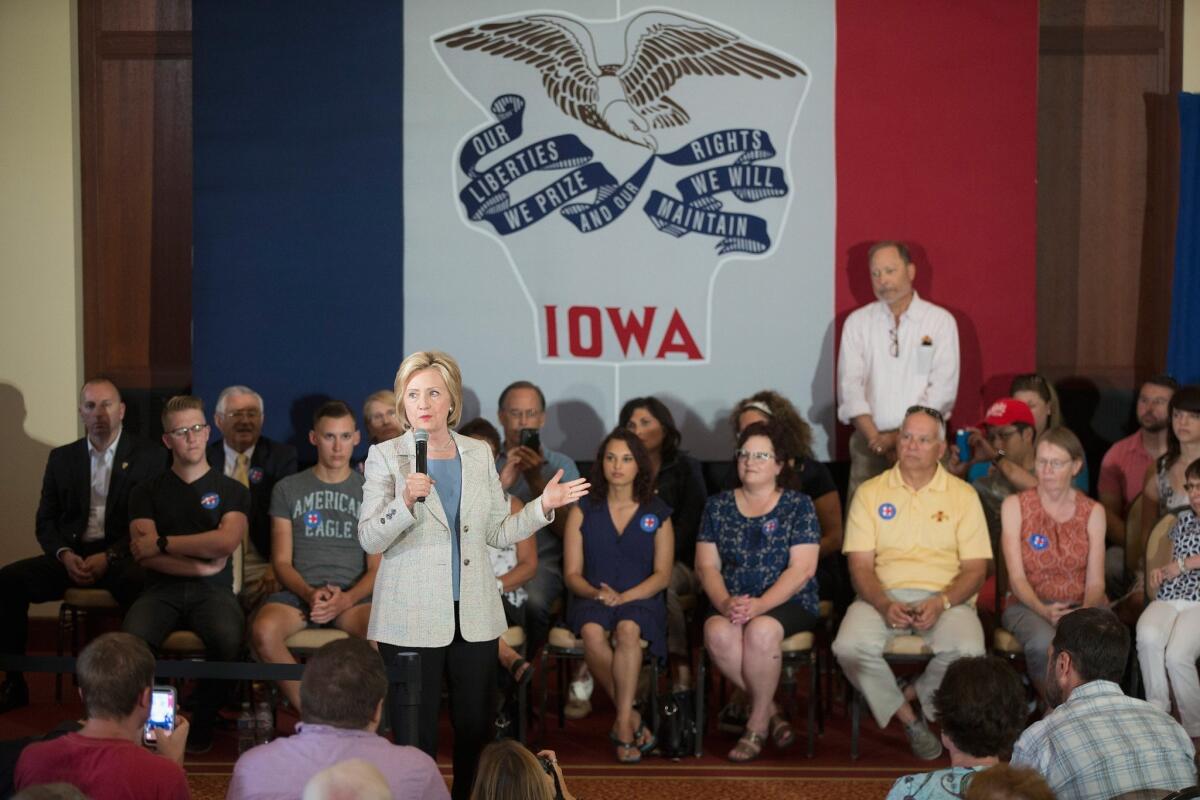Hillary Clinton unveils climate change policy

Democratic presidential hopeful Hillary Rodham Clinton at a campaign event in Ames, Iowa, on Sunday.
- Share via
Reporting from Ames, Iowa — Hillary Rodham Clinton sought to position herself as a crusader against climate change Sunday by unveiling some robust goals, even as she continued to avoid some of the more contentious battles around global warming.
Clinton announced that she will push to vastly expand the number of solar panels installed in the United States, as well as to boost overall renewable energy to the point that it will be able to fuel all homes and businesses by 2027.
The proposals reflect Clinton’s commitment to continuing the path on climate change set by President Obama, who champions numerous policies that bolster renewables and push a reduction in fossil fuel consumption.
TRAIL GUIDE: All the latest news on the 2016 presidential campaign >>
The Clinton package is incomplete, however. Unlike her rivals in the Democratic presidential contest, Clinton has yet to take a position on the controversial Keystone XL pipeline, which would transport oil from the Canadian tar sands to Gulf Coast ports. She also has yet to weigh in on a campaign to ban hydraulic fracturing nationwide, or to take a firm position on offshore oil drilling.
The proposal Clinton released Sunday for boosting solar installations by 700% is vague on details about how it would be funded.
Clinton continues to enjoy a commanding lead among Democratic primary voters. She seems unconcerned by the more detailed and aggressive proposals offered by challengers within her party.
Clinton’s plan, which campaign officials said is just the first part of a larger platform that will be rolled out gradually, appeared to be aimed squarely at distinguishing her from Republicans.
In a campaign video detailing her plan, Clinton said, “It’s hard to believe there are people running for president who still refuse to accept the settled science of climate change, who would rather remind us they’re not scientists than listen to those who are.”
As Clinton speaks in the video, quotes from GOP candidates expressing skepticism that global warming is a real threat appear on the screen. Climate change has proved a challenging issue for Republican politicians, many of whom are critical of energy policies aimed at curbing it.
Polls show that most voters believe climate change is a real threat and they want action taken. But voters also rarely cite it as their top concern.
Regardless, the issue works well for Clinton as she campaigns in Iowa, a leader in wind production. The industry’s rapid expansion here has been made possible in large part because of federal tax credits.
At a rally before about 400 people in Ames, Clinton cited the wind turbines sprouting on farms across the state.
She voiced her support for continuing the wind production credit, saying the nation’s tax code is weighted too heavily in favor of fossil fuels rather than renewable energy.
Continuation of such incentives is cited in the brief fact sheet the Clinton campaign distributed Sunday night. It also included programs to award states that are the most aggressive on renewable energy with more federal funding, a reduction in red tape that inhibits the expansion of solar energy and policy changes that would make solar power affordable for low-income households.
At the center of this part of Clinton’s energy agenda is a policy recently implemented by Obama. Clinton vows to be a protector of the Clean Power Plan, which puts strict limits on the amount of greenhouse gases power plants can release. Several states have gone to court seeking to block enforcement of the new rules.
Clinton also praised coal miners’ contributions to economic growth, a tacit acknowledgment that the shift toward clean energy is viewed skeptically by communities reliant on coal for their livelihoods. Many of those areas, including in battleground states like Ohio, are home to conservative white Democrats crucial to Clinton’s White House hopes.
“It’s important that we help them transition to a new economy,” she said. “I want to do more to help people in coal country and other parts of our nation that are not enjoying the kind of growth and development and prosperity we’re seeing in a place like Story County,” where the rally was taking place.
Some environmentalists are uneasy with Clinton’s approach so far to climate change. They would like to have seen her work as secretary of State to scuttle the Keystone project. Her relationships with donors and advisors connected to large fossil fuel companies make them anxious. And her support during her 2008 presidential run for “clean coal” as a viable, green alternative has not been forgotten.
At a town hall event in New Hampshire this month, an activist with 350.org pushed her to commit to banning fossil fuel extraction on public land. Clinton declined to do so, saying such energy production is necessary to keep the economy moving until there are enough alternatives in place.
Mehta reported from Iowa, Halper from Washington.
Twitter: @evanhalper, @LATSeema
MORE FROM POLITICS:
Biden offers from-the-heart counterpoint to GOP spectacle
San Francisco slaying upends immigration debate in 2016 presidential race
Question for governors: Why should you be president when your own constituents don’t like you?
More to Read
Get the L.A. Times Politics newsletter
Deeply reported insights into legislation, politics and policy from Sacramento, Washington and beyond. In your inbox twice per week.
You may occasionally receive promotional content from the Los Angeles Times.












